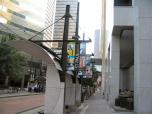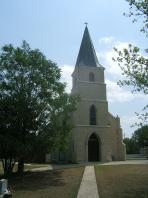




The promise of an educated and competent citizenry, capable of utilizing the great expanse of wisdom and knowledge that they had been granted, was tied up in each individual through the establishing of the early American universities. Ivy league schools such as Yale and others were established to preserve the tradition of European liberal education in the American colonies. Yale was started by clergymen. Elihu Yale can be credited with a vision for the future. He sold nine bales of goods and donated the proceeds from that transaction along with 417 books and a portrait of King George I to found this school whose charter was granted in 1701. Harvard was named after a Christian minister. Princeton still has on its crest “Dei sub numine viget,” which is Latin for “Under God she flourishes.”
The original 417 books at the Yale University library have grown to more than 12 million today. In other words, in a 311 year period, one man’s vision for the future, combined with his selfless giving of his resources, has yielded a return of xxx in books and educated hundreds of thousands of students. There are currently 168,987 living alumni according to the Yale University website.
The standards for entry into these schools were indeed high. The original Harvard Student Handbook stated that all students seeking admission to the college must be proficient in Latin and Greek so that they could study the Bible.
The handbook stated: "Let every student be plainly instructed and earnestly pressed to consider well, the main end of his life and studies is, to know God and Jesus Christ, which is eternal life, John 17:3; and therefore to lay Jesus Christ as the only foundation for our children to follow the moral principles of the Ten Commandments. “
James Madison, the fourth president of the United States, and the primary author of the US Constitution stated it this way: '"We have staked the whole future of our new nation not upon the power of government; far from it. We have staked the future of all our political constitutions upon the capacity of each of ourselves to govern ourselves according to the moral principles of the Ten Commandments."
These promising institutions educated early America’s best and brightest minds such as minister and theologian Jonathan Edwards who attended Yale, the second president of the United States, John Adams who attended Harvard, and the third president of the United States, Thomas Jefferson who was educated at the College of William and Mary.
When the leading Puritan, Increase Mather, became president of Harvard, he provided books by Christian authors in the ethics classes and strove to instill a high standard of discipline at the college. The Harvard "Laws" of 1642 and the "Harvard College Laws of 1700" testify to this. In order to be awarded a bachelor’s degree, students were required to demonstrate that they could read the original of the Old and New Testament into the Latin, and then to resolve them logically.
Other things that comprised the college curriculum for students were the instruction in Systematic Theology, beginning in 1721, the principles of natural and moral philosophy, logic, arithmetic, and astronomy. Students were required to defend a proposition or thesis. They were to write out an analysis in some branch of sacred literature. To further make them proficient orally, they were required to speak in public on the stage eight times a year, publicly discuss philosophical questions twice each month, be able to translate from the original Latin text, and to logically explain the Scriptures both in the Old and New Testaments.
The early motto of Harvard was Veritas Christo et Ecclesiae, meaning "Truth for Christ and the Church." In the early classes half the graduates became ministers. Ten out of the first twelve presidents were also ministers. By 1827 Harvard became a nucleus of theological teaching in New England.
There were many rules at Harvard in the 1700’s which students today would chafe at. A selection of these rules is below:
- All persons admitted to the College must board at the Commons, and must each pay three pounds to the steward on their entrance, and must discharge all arrears at the end of every three months; nor shall any under-graduate of the institution be allowed to board out of the College, unless by special permission of the President, or his tutor. If leave to do so shall be granted by either of these officers, the student shall faithfully observe the usual rules of the Common; but if any evey shall leave College for private quarters, without permission of the President or Tutor, he shall not enjoy any privilege of the institution.
All persons admitted to the College must board at the Commons, and must each pay three pounds to the steward on their entrance, and must discharge all arrears at the end of every three months; nor shall any under-graduate of the institution be allowed to board out of the College, unless by special permission of the President, or his tutor. If leave to do so shall be granted by either of these officers, the student shall faithfully observe the usual rules of the Common; but if any evey shall leave College for private quarters, without permission of the President or Tutor, he shall not enjoy any privilege of the institution.
- While the youth is here, he will be required to be diligent, and to observe study-hours with the same strictness as he does those of public recitation.
While the youth is here, he will be required to be diligent, and to observe study-hours with the same strictness as he does those of public recitation.
- No one must, under any pretext, be found in the society of any depraved or dissolute person.
No one must, under any pretext, be found in the society of any depraved or dissolute person.
- No one in the lower class shall leave town without express permission from the President or tutors: nor shall any student, to whatever class he may belong, visit any shop or tavern, to eat and drink, unless invited by a parent, guardian, step-parent, or some such relative.
No one in the lower class shall leave town without express permission from the President or tutors: nor shall any student, to whatever class he may belong, visit any shop or tavern, to eat and drink, unless invited by a parent, guardian, step-parent, or some such relative.
- No student shall buy, sell or exchange any thing without the approval of his parents, guardians or tutors. Whoever shall violate this rule, shall be fined by the President or tutor, according to the magnitude of the offense.
No student shall buy, sell or exchange any thing without the approval of his parents, guardians or tutors. Whoever shall violate this rule, shall be fined by the President or tutor, according to the magnitude of the offense.
- All students must refrain from wearing rich and showy clothing, nor must anyone go out of the college yard, unless in his gown, coat, or cloak.
All students must refrain from wearing rich and showy clothing, nor must anyone go out of the college yard, unless in his gown, coat, or cloak.
- Every under-graduate shall be called by his surname only, unless he is a commoner, or the oldest son of a gentleman, or the child of a noble house.
Every under-graduate shall be called by his surname only, unless he is a commoner, or the oldest son of a gentleman, or the child of a noble house.
- No person in a higher class, Tutors and Fellows of the college excepted, shall be allowed to force a freshman or junior to go on errands or do other services, by blows, threats or language of any kind. And any undergraduate who violates this rule, shall be punished by bodily chastisement, expulsion, or such other mode as shall seem adviseable to the President and Fellows.
No person in a higher class, Tutors and Fellows of the college excepted, shall be allowed to force a freshman or junior to go on errands or do other services, by blows, threats or language of any kind. And any undergraduate who violates this rule, shall be punished by bodily chastisement, expulsion, or such other mode as shall seem adviseable to the President and Fellows.
- Students of all grades are to abstain from dice, cards and every species of gaming for money, under penalty, in the case of a graduate, of twenty shillings for each offense; and, if the offender is an undergraduate, he shall be liable to punishment, at the discretion of the President or tutor shall assign.
Students of all grades are to abstain from dice, cards and every species of gaming for money, under penalty, in the case of a graduate, of twenty shillings for each offense; and, if the offender is an undergraduate, he shall be liable to punishment, at the discretion of the President or tutor shall assign.
- If any student is absent from prayers, or recitation, unless necessarily detained, or by permission of the President or tutor, he shall be liable to an admonition; and if he commit the offence more than once in a week, to such other punishment as the President or tutor shall assign.
If any student is absent from prayers, or recitation, unless necessarily detained, or by permission of the President or tutor, he shall be liable to an admonition; and if he commit the offence more than once in a week, to such other punishment as the President or tutor shall assign.
- No student shall be absent from his studies or stated exercises for any reason, (unless it is first made known to the President or tutor, and by them approved) with the exception of the half-hour allowed for lunch, and half-hour for dinner and also for supper, until nine o'clock.
No student shall be absent from his studies or stated exercises for any reason, (unless it is first made known to the President or tutor, and by them approved) with the exception of the half-hour allowed for lunch, and half-hour for dinner and also for supper, until nine o'clock.
- If any student shall, either through wilfulness or negligence, violate any law of God or of this college, after being twice admonished, he shall suffer severe punishment, at the discretion of the President or his tutor. But in high-handed offences, no such modified forms of punishment need be expected.
If any student shall, either through wilfulness or negligence, violate any law of God or of this college, after being twice admonished, he shall suffer severe punishment, at the discretion of the President or his tutor. But in high-handed offences, no such modified forms of punishment need be expected.
As I said, many students today would find these rules and practices unacceptable. However, the 18th century graduated some of the most brilliant minds and multi-talented individuals in the history of the country. These were people who were not allowed to make excuses. They were simply expected to achieve. Two of the three gentlemen mentioned above: Jonathan Edwards, and Thomas Jefferson, can be examined in greater detail in the margins of this article.
Early American Promise
Posted: October 7, 2012 by Chuck DeShazo
Articles
Early American Promise

Jonathan Edwards (1703-1758) was a Christian preacher and outstanding philosophical theologian, widely acknowledged to be one of America's greatest intellectuals. He is often associated with Reformed theology, the metaphysics of theological determinism, and the Puritan heritage. Edwards grounded his life's work on conceptions of beauty, harmony, and ethical fittingness. Historians have noted how central the Enlightenment was to his mindset. He played a critical role in shaping the First Great Awakening, overseeing some of the first revivals in 1733–35 at his church in Northampton, Massachusetts.
Edwards is famous for his sermon "Sinners in the Hands of an Angry God", a classic of early American literature. He is also well known for his many books, The End For Which God Created the World, The Life of David Brainerd, which served to inspire thousands of missionaries throughout the 19th century, and Religious Affections, which many Reformed Evangelicals still read today.
He entered Yale College in 1716, at just under the age of 13. In the following year, he became acquainted with John Locke's Essay Concerning Human Understanding, which influenced him profoundly. During his college studies, he kept note books labeled "The Mind," "Natural Science" (containing a discussion of the atomic theory), "The Scriptures" and "Miscellanies," had a grand plan for a work on natural and mental philosophy, and drew up for himself rules for its composition. He was interested in natural history, and at the age of 17, wrote a remarkable essay on the habits of the "flying spider."
Even before his graduation in September 1720, as valedictorian and head of his class, he seems to have had a well formulated philosophy. As he was studying theology the next two years, Edwards continued to be interested in science, seeing the natural world as evidence of God's masterful design. Edwards went into the woods often throughout his life to pray and worship in the beauty and solace of nature.
The followers of Jonathan Edwards and his disciples came to be known as the New Light Calvinist ministers Through a practice of apprentice ministers living in the homes of older ministers, a large number of pastorates in the New England area were filled. Many of Jonathan and Sarah Edwards's descendants became prominent citizens in the United States, including the Vice President Aaron Burr and College Presidents Timothy Dwight, Jonathan Edwards Jr. and Merrill Edwards Gates. Jonathan and Sarah Edwards were also ancestors of First Lady Edith Roosevelt, the writer O. Henry, publisher Frank Nelson Doubleday and writer Robert Lowell. The Edwards family produced scores of clergymen, thirteen presidents of higher learning, sixty-five professors, and many other persons of notable achievements."
Edwards's writings and beliefs continue to influence individuals and groups today. Early American Board of Commissioners for Foreign Missions missionaries were influenced by Edwards's writings, through reports in the their journal "The Missionary Herald." The Banner of Truth Trust and other publishers continue to reprint Edwards's works. Most of his major works are now available through the Jonathan Edwards Center in a series published by Yale University Press. Author and teacher, Elisabeth Woodbridge Morris, memorialized him, her paternal ancestor in two books, The Jonathan Papers (1912), and More Jonathan Papers (1915). In 1933, he became the namesake of Jonathan Edwards College, the first of the 12 residential colleges of Yale. The Evangelical Lutheran Church in America remembers him each March 22.
Thomas Jefferson (1743– 1826) was an American Founding Father, the principal author of the Declaration of Independence and the third President of the United States. At the beginning of the American Revolution, he served in the Continental Congress, representing Virginia and then served as a wartime Governor of Virginia. Just after the war ended, Jefferson served as a diplomat, in Paris. He then became the United States Minister to France. Jefferson was the first United States Secretary of State serving under President George Washington. With his close friend James Madison he organized the Democratic-Republican Party, and was elected Vice President in 1796. His correspondence was renown. He was an indefatigable letter writer, corresponding with many influential people in America and Europe.
Elected president in 1800, he oversaw the purchase of the Louisiana Territory from France, and sent the Lewis and Clark Expedition to explore the new west. In 1807, President Jefferson signed into law a bill that banned the importation of slaves into the United States.
A leader in the Enlightenment, Jefferson spoke five languages and was deeply interested in science, invention, architecture, religion and philosophy, interests that led him to the founding of the University of Virginia after his presidency. He designed his own large mansion, Monticello, on a 5,000 acre plantation near Charlottesville, Virginia.
Jefferson began his childhood education under the direction of tutors at Tuckahoe In 1752. He attended a local school run by a Scottish Presbyterian minister. His aptitudes enabled him to begin studying Latin, Greek, and French, by the age of nine. During this time, he learned to ride horses, and began to appreciate the study of nature. He studied history, science and the classics under the Reverend James Maury from 1758 to 1760.
Jefferson entered the College of William & Mary in Williamsburg at age 16, studying mathematics, metaphysics, and philosophy, as well as the writings of the British Empiricists, including John Locke, Francis Bacon, and Isaac Newton. During this time he also improved his proficiency on the violin. He was a very diligent student, exhibiting an avid curiosity in all the fields he was exposed to, managing to graduate from the university in only two years. During this time, he first met the law professor George Wythe, who became his influential mentor Jefferson read law while working as a law clerk for Wythe. Simultaneously, he also read a wide variety of English classics and political works, and succeeded in being admitted to the Virginia bar in 1767.
Throughout his life, Jefferson depended on books for his education. He collected and accumulated thousands of books for his library at Monticello. When his father Peter died, Thomas inherited, among other things, his large library. A significant portion of his library was also bequeathed to him in the will of George Wythe, who had an extensive collection.
In 1768, Jefferson began construction of his primary residence, Monticello, on a hilltop overlooking a 5,000 acre plantation. Turning Monticello into a neoclassical masterpiece after the Palladian style (which he helped to popularize in the US) would be his continuing project. While Minister to France he had opportunity to discover the "modern" trends in French architecture then fashionable in Paris. In 1794, he began rebuilding Monticello based on these ideas. The remodeling continued throughout most of his presidency The most notable change was the addition of the octagonal dome.
Simultaneous to his initiation of the construction of Monticello, Jefferson represented Albemarle County in the Virginia House of Burgesses beginning on May 11, 1769 and ending June 20, 1775. Following the passage of the Intolerable Acts by the British Parliament in 1774, Jefferson wrote a set of resolutions against the acts. These were later expanded into A Summary View of the Rights of British America, in which he expressed his belief that people had the right to govern themselves.
While Minister to France, Jefferson was impressed by France's military standardization program known as the Système Gribeauval. As president, he initiated a program at the Federal Armories to develop interchangeable parts for firearms. the concept of interchangeable parts eventually led to modern industry and was a major factor in the United States' industrial power by the late 19th century.
Jefferson was a farmer, with a lifelong interest in mechanical innovations, new crops, soil conditions, his gardens, and scientific agricultural techniques He was interested in birds and wine, and was a noted gourmet. Jefferson was a prolific writer. He learned Gaelic to translate Ossian, and sent to James Macpherson for the originals.
Jefferson invented many small practical devices and improved contemporary inventions. These include the design for a revolving book-stand to hold five volumes at once to be viewed by the reader. Another was the "Great Clock", powered by the Earth's gravitational pull on Revolutionary War cannonballs. Its chime on Monticello's roof could be heard as far as the University of Virginia. Jefferson invented a 6 in (15 cm) long coded wooden cipher wheel, mounted on a metal spindle, to keep secure State Department messages while he was Secretary of State. The messages were scrambled and unscrambled by 26 alphabet letters on each circular segment of the wheel. He improved the moldboard plow and the polygraph.
After leaving the Presidency, Jefferson’s crowning achievement was the founding of the University of Virginia, in 1819. Upon its opening in 1825, it was the first university to offer a full slate of elective courses to its students. One of the largest construction projects to that time in North America, the university was notable for being centered about a library rather than a church.
The article mentioned earlier, Jefferson’s involvement in the design of Monticello. He was an accomplished architect, and therefore it was natural for him to be the principal designer of the University grounds. Its innovative design was an expression of his aspirations for both state-sponsored education and an agrarian democracy in the new Republic. He was a strong advocate of the Greek and Roman styles, as he held them to be most historically representative of American democracy. Each academic unit was designed with a two story temple front facing the quadrangle, while the design of the library was inspired by the Roman Pantheon. A survey of members of the American Institute of Architects identified Jefferson's campus as the most significant work of architecture in America. Jefferson envisioned any citizen of the state could attend college based upon his or her ability.